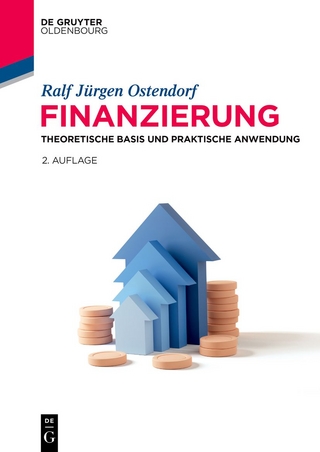
Routledge Handbook of Social and Sustainable Finance
Routledge (Verlag)
978-1-138-77754-5 (ISBN)
With a clear societal or environmental mission, foundations, individual and group investors, as well as public bodies around the world have become increasingly eager to finance and support innovative forms of doing business. Together, founders and established businesses alike are embracing new sustainable business models with a distinct stakeholder approach to tackle social or environmental problems in what they see as a failed economic system in crisis. As a result, the topic of social and sustainable finance is at the forefront of financial economic thought.
This Handbook is divided up into three parts. The first, "The Landscape of Social and Sustainable Finance and Investments", comprises of chapters from a multitude of perspectives in an effort to grasp the entirety of the landscape. The second, "Challenges, Suggestions, Critiques and Debates", focuses on areas ranging from sociological underpinnings to critical takes on markets, and the identification of specialized business models. Amongst ethical considerations, topics include the scaling of impact, an analysis of sustainability as risk prevention and comparative analyses of various methods of justification and measurement. In the third and final section, "Markets and Institutions", contributions range from various perspectives on sustainable banking to environmental marketplaces, and finally on to practical cases and country specific observations.
This volume is essential reading for both academics and students in economics and finance. It is also of interest to those who study environmental economics, microeconomics and banking.
Othmar M. Lehner is a full professor of Finance and a leading researcher in the field of social finance and impact investment. With a professional background as a bank manager, he now dedicates his academic career to the advancement of the field through research publications, advisory services, conferences, and lecturing in MBA and doctoral programmes.
Part 1: The Landscape of Social and Sustainable Finance and Investments 1. The landscape and scale of Social and Sustainable Finance (Linne Marie Lauesen) 2. Sustainable finance: building a more general theory of finance (Scott Fullwiler) 3. The architecture of social finance (Gadaf Rexhepi) 4. The emergence and institutionalization of the field of social investment in the United Kingdom (Belinda Bell and Helen Haugh) 5. Academic research into social investment and Impact Investing: the status quo and future research (Jess Daggers and Alex Nicholls) 6. Impact Investing (Olaf Weber) 7. Social Impact Investing: a model and research agenda (Alessandro Rizzello, Maria Cristina Migliazza, Rosella Carè, and Annarita Trotta) 8. Impact Investing: funding social innovation (Rebecca Tekula and Archana Shah) 9. Crowdfunding social ventures: a model and research agenda (Othmar M. Lehner) 10. Social Impact Bonds: exploring and understanding an emerging funding approach (Jim Clifford and Tobias Jung) 11. Lending to social ventures: existing demand for finance and the potential roles of social investment (Fergus Lyon) Part 2: Challenges, Suggestions, Critiques, and Debates 12. Social responsibility in Islamic Finance (Ainulashikin Marzuki and Andrew C. Worthington) 13. Seeing ourselves as others see us: incorporating reflexivity in Corporate Social Responsibility (Christopher Mason and John Simmons) 14. Socially Responsible Investment as emergent risk prevention and means to imbue trust in the post-2008/2009 World Financial Crisis economy (Julia M. Puaschunder) 15. Socially Responsible Investments and Islamic investments: is there a difference? (Saeed Binmahfouz) 16. Social investment and fiduciary responsibilities (Tommi Lehtonen) 17 Corporate Social Responsibility and financial performance in Italian co-operative banks (Eleonora Broccardo, Ericka Costa, and Maria Mazzuca) 18. Integral sustainability or how evolutionary forces are driving investors’ trust and the integration of people, planet, and profit (Mariana Bozesan) 19. Studying crowdfunding through extreme cases (Pascal Dey and Laurent Marti) 20. Institutional analysis of Venture Philanthropy (Tamaki Onishi) 21. The convergence paradox of Islamic Finance: a sociological reinterpretation, with insights for proponents of social finance (Aaron Z. Pitluck) 22. Joint social-financial value creation in social enterprise and social finance and its implications for measurement creation and measurement of profit and impact in social financing (Sean Geobey) 23. Organizational hybridity in social finance: a comparative analysis (Gunnar Glänzel and Björn Schmitz) 24. Measuring and comparing social value creation: advantages and disadvantages of a new comparability method, IRIS, GIIRS, and SROI (Arne Kroeger and Christiana Weber) 25. Sustainable institutional investment models and the human capital analytics approach: a great gap to be filled (Carol Royal and G. Sampath S. Windsor) 26. Opening the market for Impact Investments: the need for adapted portfolio tools (Lisa Brandstetter and Othmar M. Lehner) Part 3: Markets and Institutions 27. Social banks’ mission and finance (Olaf Weber) 28. Growing social banking through (business) associations (Daniel Tischer and Sven Remer) 29. Common good disclosure: a framework for analysis (Clelia Fiondella, Marco Maffei, Rosanna Spanò, and Claudia Zagaria) 30. The quality of bank capital in cooperative banks: lessons from history and the current financial crisis (Andrea Bonoldi, Eleonora Broccardo, Luca Erzegovesi, and Andrea Leonardi) 31. The recent development and performance of ethical investments (Philippe Gillet and Julie Salaber-Ayton) 32. The evolution of regulations in banking: a cycle-based approach (Mehmet Hasan Eken, Suleyman Kale, and Hüseyin Selimler) 33. Evolving roles of regulators in the implementation of environmental and social governance in the financial institutions of emerging markets (Adeboye Oyegunle) 34. Trading under uncertainty: an investigation of the Australia emissions market (Deborah Cotton and Marija Buzevska) 35. Credit risk and ecosystem services: a review of small-scale emission-certified agroforestry (Emmanuel Olatunbosun Benjamin and Gertrud Buchenrieder) 36. Evolution of the EU emissions trading system: a new emphasis on distributional and scaling-up dimensions (Noriko Fujiwara) 37. Climate change mitigation: are carbon markets the “silver bullet” solution? (Scott J. Niblock and Jennifer L. Harrison) 38. The landscape of Social and Sustainable Finance in Visegrad (V4) countries (Daniela Majerčáková) 39. Government-sponsored Venture Philanthropy and social entrepreneurship in China: an exploratory study (Qihai Cai) 40. The role of Social Investors in developing and emerging economies (Lisa M. Hanley, Aline Margaux Laucke, and Tim Weiss) 41. Building the Impact Investing market: drivers of demand and the ecosystem conditioning supply (Maximilian Martin) 42. Formative dynamics in the UK social investment market, 2000–2015: an “organization rich” agenda on how markets form (Guillermo Casasnovas and Marc J. Ventresca) 43. Regional Impact Investing for institutional investors: the Bay Area Impact Investing Initiative (Lauryn Agnew)
| Erscheinungsdatum | 25.05.2016 |
|---|---|
| Reihe/Serie | Routledge International Handbooks |
| Zusatzinfo | 82 Tables, black and white; 95 Line drawings, black and white; 95 Illustrations, black and white |
| Verlagsort | London |
| Sprache | englisch |
| Maße | 174 x 246 mm |
| Gewicht | 1590 g |
| Themenwelt | Wirtschaft ► Betriebswirtschaft / Management ► Finanzierung |
| Wirtschaft ► Betriebswirtschaft / Management ► Marketing / Vertrieb | |
| Wirtschaft ► Volkswirtschaftslehre ► Mikroökonomie | |
| ISBN-10 | 1-138-77754-4 / 1138777544 |
| ISBN-13 | 978-1-138-77754-5 / 9781138777545 |
| Zustand | Neuware |
| Haben Sie eine Frage zum Produkt? |
aus dem Bereich


